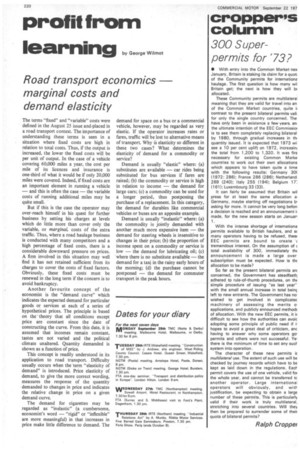cropper's column
Page 220

If you've noticed an error in this article please click here to report it so we can fix it.
300 Super permits for '73?
• With entry into the Common Market nex January, Britain is staking its claim for a quot of the Community permits for internationa haulage. The first question is how many wil Britain get; the next is how they will bi allocated.
These Community permits are multilateral meaning that they are valid for travel into an of the Common Market countries, quite contrast to the present bilateral permits yeti. for only the single country concerned. The have only been in existence a few years, an the ultimate intention of the EEC Commissioi is to see them completely replacing bilateral by 1980, through gradual increases in to quantity issued. It is expected that 1973 wii see a 10 per cent uplift on 1972, increasini the total from 1,200 to 1,320. It was firs necessary for existing Common Marke countries to work out their own allocations which appears to have taken quite a time with the following results: Germany 30( (1972: 286); France 286 (286); Netherland: 269 (240); Italy 255 (194); Belgium 17; (161); Luxembourg 33(33),
It can fairly be assumed that Britain wil press for at least the same allocation a: Germany, maybe starting off negotiations 1:), asking for more. It cannot be very long befori a decision is reached and an announcement made, for the new season starts on Januar" 1.
With the intense shortage of internationa permits available to British hauliers, and s( many operators having to be refused, thess EEC permits are bound to create 's tremendous interest. On the assumption of s total availability of 300, immediately th€ announcement is made a large over subscription must be expected. How is th( allocation to be made?
So far as the present bilateral permits are concerned, the Government has steadfast!) adhered to rule-of-thumb procedures, on the simple procedure of issuing "as last year" with the small annual increase in total beinç left to new entrants. The Government has no. wished to get involved in complicatec machinery of assessing the merits o. applications, and publicly announced method; of allocation. With the new EEC permits, it is difficult to see how the authorities can avoic adopting some principle of public need if i. hopes to avoid a great deal of criticism, anc having to answer why some operators go: permits and others were not successful. Ye: there is the minimum of time to set any such system into operation.
The character of these new permits it multilateral use. The extent of such use will be checked by journey records which have to be kept as laid down in the regulations. Each permit covers the use of one vehicle, valid for the whole year, and cannot be transferred tc another operator. Large international operators will obviously, and with justification, be expecting to obtain a large number of these permits. This is particularly valid if their work is truly multilateral, stretching into several countries. Will they then be prepared to surrender some of their quota of bilateral permits?
Ralph Croppel
































































































































































































































































































































































































































































































































